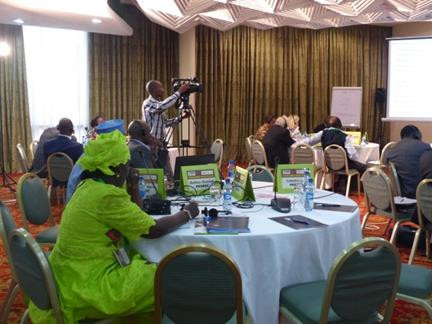
Since 2007, the German development cooperation supports the CAADP (Comprehensive Africa Agriculture Development Programme) process on a regional level through various programs and projects. In 2012, three GIZ projects were bundled in the Programme "Support to Pan-African reform processes in Agricultural Economic Development".
In the context of this Programme AFC had been contracted in 2013 to assist the five African Regional Farmers Organisations (RFOs) in planning and organisation of the CAADP Africa Forums, to identify gaps and weaknesses in the organisation of the forums and propose and implement respective training and thus, contribute to the capacity building within these organisations.
The CAADP Africa Forums are an exchange platform with the purpose of sharing and learning among farmers, experts and decision makers from different agricultural sub-sectors across Africa. During the course of the project AFC supported the organisation of five regional and two continental forums on subjects such as small-holder commercialisation (livestock and potato value chains), family farming and youth, technology and agricultural transformation. The two continental forums were hosted by PAFO, the Pan-African Farmers Organisation and implemented by the Southern African Confederation of Agricultural Unions (SACAU) in 2014 and by the East African Farmers Federation (EAFF) in 2016. The forums were organised for a total of approx. 500 participants with a 35% participation of women.
The final continental PAFO Forum under the AFC contract was held in September 2016 in Nairobi, the topic chosen jointly by all five RFOs was “Protection, Preservation and Promotion of African Indigenous Livestock Breeds. The African continent is rich in indigenous livestock breeds and they are successfully used in a wide range of production systems. However, despite their evident value and success, indigenous breeds are at risk; some have populations so small as to be in danger of extinction while others are continuously crossbred with exotic breeds. Thus, African indigenous livestock breeds need to be protected and preserved, but this will only happen if livestock owners will realise the need to do so, not out of a nostalgic notion, but because indigenous breeds make productive sense. Indigenous livestock is more resilient than imported breeds; their resistance to disease and thermos-stress is a feature of growing importance in times of climate change.
The PAFO Forum therefore brought together a small but specialised group of participants from across all African regions to:
- obtain an overview of the status of indigenous livestock breeds for each of the five regions
- discuss best practices with respect to the breeding and keeping of indigenous livestock breeds in these regions
- be informed about marketing opportunities for indigenous livestock breeds at national and regional level
- be informed of the support measures (e.g. breeding programmes, research and lobby initiatives) available for the protection and promotion of indigenous livestock breeds.
Five AFC regional livestock consultants assisted the RFOs in each region to compile background information, identify best practices and prepare presentations for the forum.
The forum was considered as a great success, Discussions were detailed and deep and a charter of resolutions and a way forward was produced as an outcome of the Forum. During final discussions with the PAFO president, it was agreed that the outcome of the forum will be used to develop it into a PAFO Livestock Strategy for Africa. The aim of this strategy will be to guide service delivery by RFOs and their national members with respect to livestock.
For further information please contact tesa.weiss [at] afci.de
